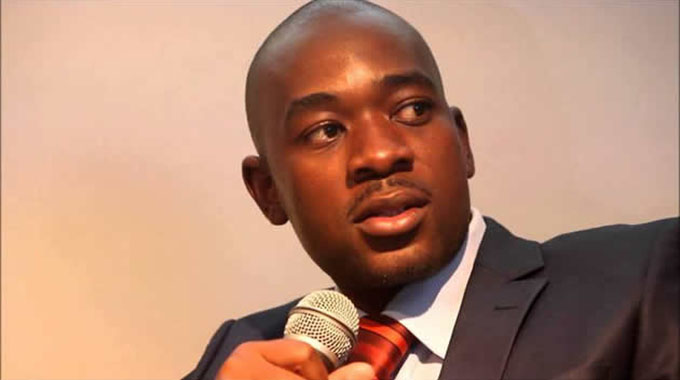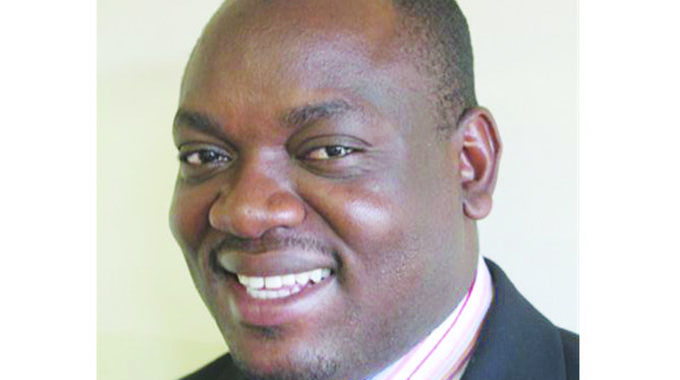Voice of Africa calls for maturity

Reason Wafawarova on Monday
At the launch of the MDC in 1999 Morgan Tsvangirai got carried away and chanted that infamous “We will remove you violently” statement that got him in trouble with the law. It was a sign of immaturity that was to be followed by many more similar bloopers, like openly calling on South Africa to switch off electricity on Zimbabwe and so on.
The MDC is turning 20 years in September this year, and it is now under the leadership of Nelson Chamisa. Like his predecessor, Chamisa has shown his own version of immaturity, albeit in a more breathtaking manner.
He started off by calling on the United States to keep economic sanctions against Zimbabwe in place; followed that up by blatantly lying that he had personally met Donald Trump and was promised billions of dollars. He also made outrageously ridiculous promises in the run-up to the July 2018 election, but more importantly he declared that no result of the election other than his victory would be legitimate, regardless of how the election was rated by observers, or how the people voted. His win was the only acceptable arbiter for the legitimacy of the election itself.
Even today, Chamisa sounds more than convinced when he says there is a legitimacy crisis in the country. He believes his absence from Government is in itself a legitimacy crisis, and he looks so serious about it, it’s not funny.
When he lost the election by about 400 000 votes last year, he announced he was going to appeal the result at the Constitutional Court, and again he said only one court outcome would be acceptable to him – a ruling in his favour. He said any other outcome would not be acceptable or legitimate, and that he would be left with only one option – to pour sand in the national food plate. His youthful supporters are quite impressionable about this slogan.
When Tsvangirai was giving his maiden speech at the MDC launch in 1999, he was, like many in the then young leadership in the opposition, clearly carried away by the rhetoric of freedom and democracy. This would shape the modus operandi of the opposition for many years to come – the idea that freedoms and liberties to cause trouble are the essence of democracy.
To the then emerging political leadership in the opposition MDC, and to its equally emerging support base the rhetoric about a promised new era of freedom and democracy through “change” created a wayward kind of zeal. It was like a rich kid just discovering the Church of Scientology.
The zeal marked the beginning of an evangelical road to discovering the wonders of democratic liberties as espoused in the synoptic gospel of international law in general, and human rights law in particular. To most of the MDC activists, human rights law is all about permission to freely hold political rallies and violent street marches – the right to deride, ridicule and vilify political opponents without censure, and the right to stone and beat up those that may choose not to participate in opposition-organised marches.
On January 14 this year we saw that our opposition has sadly regressed back to the politics of immaturity – something that had changed after the election of 2008.
So we have a party whose supporters believe free media is media that relentlessly bashes ZANU-PF and forever praises everything and anything from the opposition.
In the aftermath of the January 14 violent and deadly MDC Alliance riots, there has been massive exaggeration, sensationalisation and biased reporting on the State’s response to the violence. While there are genuine and meritorious cases of abuse of power by some rogue members of the security forces; including but not limited to reported robberies, extortion, bashing of innocent civilians, and so on, there are also countless of unsubstantiated stories about killings, rape, torture and other atrocities, most of which are very sensational.
Tendai Biti has even purported a Rwanda-like genocide.
The opposition has roped in our erstwhile colonisers, so yet again, in the name of upholding the rule of law, we are seeing a renewed onslaught on the efforts of Zimbabwe to recover its economy and rejoin the family of nations. We hear voices saying we do not qualify for a good economy and a place among the family of nations because our security forces did not allow our hooligans and thugs the freedom to do as they pleased on January 14.
We should have left them to burn the country down until ZANU-PF invites Chamisa to take over the State House.
We are still stuck with an opposition that supports and uphold the aggression of economic sanctions on our economy – an opposition that openly hails and defends ZDERA, the United States sanctions law. This is a sanctions law that is supremacist in content, and imperialist in application.
It is now almost 20 years after the MDC was formed, and Zimbabwe is grappling with efforts to stabilise the rocking boat that our economy is. We probably sunk to our deepest lowest in 2008, after which the economy showed signs of recovery.
When Nelson Chamisa took over the MDC after the death of Morgan Tsvangirai he clearly was convinced that the only way to remove ZANU-PF from power is to exacerbate the country’s economic woes.
So Chamisa leads a party that celebrates cash shortages, a party that cheers government failure, a party that attacks those who condemn sanctions on Zimbabwe, a party that rejoices in the anger of the masses, a party that spreads hate towards authority, a party that is totally committed to sabotage, rebellion, and lawlessness. A party that wishes for the day hospital staff will leave patients to die en mass on their hospital beds; a party that celebrates the day when our teachers desert our schools to leave our children unattended.
So the MDC will attack any country that welcomes our Government, including the UK, and will lobby the EU, the Commonwealth, the World Bank and the IMF to stifle every effort at economic recovery from the Government of Zimbabwe. Nelson Chamisa calls it pouring sand in the national food plate, and he openly brags about it.
Pro-opposition Zimbabweans in the Diaspora strongly back Chamisa’s isolationist politics, on whose basis many of them gained entry into Western countries as asylum seekers.
In September 2007 the MDC under Tsvangirai changed course and joined hands with ZANU-PF to pass Constitutional Amendment No. 18 without debate. This was to facilitate the dawn of harmonised elections where elections for local government, Parliament, Senate and the Presidency all take place in one day.
Lovemore Madhuku and his then NCA civic organisation were totally angry for obvious reasons. The MDC was endorsing a Constitution that the NCA was fighting, and that was treachery. The BBC described the opposition’s move as a bargain deal; we Zimbabweans saw it as political maturity on the part of MDC MPs.
Thokozani Khupe said it was the beginning of the end of the Zimbabwe crisis. Ironically, she has said exactly the same words after a national dialogue meeting recently convened at the State House by President Mnangagwa.
Nelson Chamisa was as expected absent at the dialogue meeting, ostensibly because he does not want to mix with election losers. He came second best, therefore he is not a loser like all others, and no meaningful dialogue can happen without him – the man who defines the legitimacy of everything.
In 2007 Africa asserted its opinion on the politics of Zimbabwe, effectively taming and rehabilitating the opposition so it could depart from its identity as a Western political project to a truly home-grown African democratic party. It appears all gains made to this effect when Tsvangirai was still alive have been eroded badly since the day Chamisa took over the leadership of the main opposition illicitly.
Back then it took Africa just five months to speak so eloquently and clearly to the MDC, without giving the party a single cent, as would the West whenever they wanted to spur the opposition into some form of action.
For Africa, Dar es Salaam was the beginning of a good lesson in March 2007, as SADC introduced the African perspective; Accra was the body and content of the script as the AU spoke on Africa’s position on Zimbabwe in July; and September brought the conclusion as SADC stood resolutely with Zimbabwe at the Lusaka summit.
The shunning, public reprimand and negative publicity received by the MDC, especially in Accra, Ghana, and Lusaka, Zambia, brought the insidious opposition to a sobering landing, and bit by bit they became a little more than careful in their vilification of the African leadership.
Nelson Chamisa has taken the MDC back to the days of obnoxious behaviour, and clearly Africa is far less than amused. The AU has no time for him at all, SADC is openly against him and his politics, and individual African leaders are now sick and tired of being sick and tired of Nelson Chamisa’s politics. Leaders of Botswana, Zambia, Namibia, Kenya and South Africa have all come out in the open in solidarity with the people of Zimbabwe, condemning unconditionally the economic sanctions on our country.
The MDC Alliance can’t possibly stand and accuse Africa of propaganda, and neither can they accuse the continent of being bent on delaying or preventing change in Zimbabwe. To Africa change has come to Zimbabwe, and it is time to give the Mnangagwa administration a chance to revive the country’s image and economy.
To the opposition the message is very clear – it is the African way or the high way to political oblivion. Africa will not support the politics of chaos, and Africa will stand against the politics of sanctions.
Clearly, the dual gamble of trying the politics of elections on one hand; and street-based government overthrowing adventures on the other has proved a futile exercise.
The MDC must take stock of its election losses in 2005 (parliamentary elections), 2006 (council elections) 2013 and 2018 harmonised elections. The idea of organising urban youths with the hope of marching to State House after losing elections was tried and tested by Morgan Tsvangirai. It simply does not work, and putting the sand slogan on it will not change anything. Violence in Zimbabwe is always successfully thwarted, and that is not about to change.
Nelson Chamisa’s hope is the declining economy, as was the hope of Morgan Tsvangirai in 2007 and 2008. But did a declining economy install Morgan Tsvangirai as the president of the Republic?
Well, he became the fourth in charge when ZANU-PF and the MDC formed the inclusive Government of 2009-2013.
Tsvangirai was the country’s Prime Minister in that arrangement, sitting as a Senior Minister in a Cabinet that was chaired by Robert Mugabe, or by any of his two deputies if he was not present.
We do hope that Africa’s decisive message on Zimbabwe will sober up the excitable leader of the opposition. Chamisa has not impressed African leadership as a serious politician at all. Even rabble-rousing Julius Malema thinks he is just a nasty piece of work with very little direction. He is all froth and no beer; all ice tip and no iceberg.
Nelson Chamisa is the kind of politician who cannot be amicable with ZANU-PF even at other people’s funerals. He will pick fights with the party at church gatherings, and at every given opportunity. Political maturity means you know when and where to pick your fights. Not every gathering is a political rally, and not every speech is a political one.
The West, too, is undecided on Chamisa. While his eloquence of speech and charisma is tempting, his intellect and sense of judgment are often a humiliation on his political personality. We all know that the West is not interested in the MDC or in ZANU-PF, but in any politician that will either do their bidding, or compromise good enough to allow the imperial agenda a sense of success.
For me, two home-grown main political parties is what Zimbabwe needs to safeguard it national interest. I want a Zimbabwe where the two top parties agree that economic sanctions on Zimbabwe by any foreign power are an aggression on the people of Zimbabwe.
I want a Zimbabwe where all political parties agree that credit lines cannot be used as a political tool to further the prospects of one political party over another.
I want a Zimbabwe where politicians are mature enough to know and accept that national events stand above political affiliation, that the deaths and funerals of prominent people cannot be used as political platforms where eulogies are turned into political scoring games.
This is what Nelson Chamisa thinks he is capable of doing politically. He thinks he is the only one that can get ZDERA repealed, the only one that can get grants and loans from the West, and the only one that can be trusted by Western elites.
What Zimbabwe needs now is a good and effective President, not a charming, pliant good messenger to Western capitals. What is happening in Venezuela right now is not working there, and it will certainly not work in Zimbabwe.
We simply do not do Western-recognised presidents here. We do our own presidents, and we fight dirty and wild if our right to self-determination is tampered with.
In 2007, Welshman Ncube said something to the effect that it was not necessary to keep playing politics for the sake of politics while the country was bleeding. That is how mature politicians should behave and we hope Ncube can pass on his wisdom to his boss Nelson Chamisa. It is a fact Chamisa listens to no one, but a try would not be misplaced.
Nelson Chamisa has revived Western moneybags for sellout NGOs, and they truly love him for that. After the 2013 elections, the Western- funded civic organisations were hit hard by donor fatigue as all hope for regime change vapoured with the demising Tsvangirai.
Our hope is that Zimbabweans in the civic sector may be mature enough to place the collective national interest above greed and want.
Charity is a multi-trillion-dollar industry globally, and what happens with politicised aid is that people will fight down their own conscience in efforts to please the foreign donor.
ZANU-PF is by no means the best example of mature politics, but that alone does not mean we find solace in engaging in immaturity ourselves. Our young generation must outshine ZANU-PF in maturity, not in immaturity.
You can only beat ZANU-PF by doing better, not outdoing it in its own shortcomings.
While we point out at the immaturity of some of our senior politicians in the ruling party, and that of its upcoming young politicians as well, may we in the same vein try to show our own understanding of maturity by practice and deeds.
Zimbabwe we are one and together we will overcome. It is homeland or death!
Reason Wafawarova is a political writer based in Sydney, Australia.







Comments